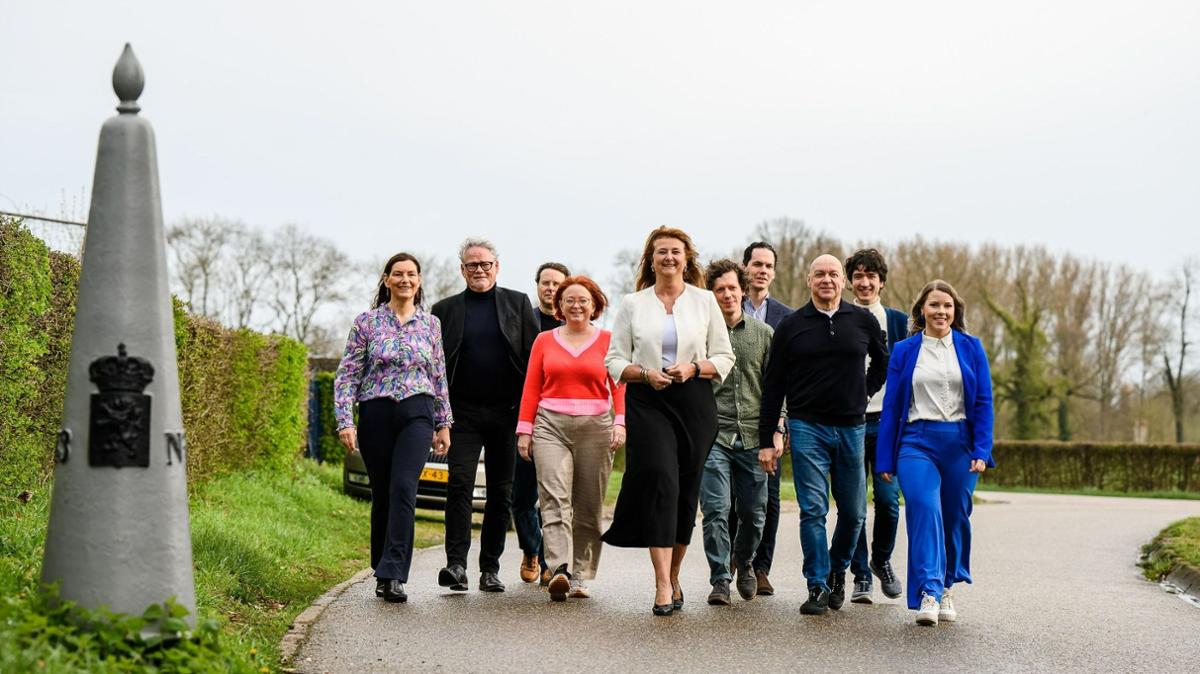 |
| Foreword |
Since the Dutch cabinet fell in mid-July, things have changed in the political landscape. The BBB, which champions the agricultural landscape of the Netherlands, also became a player to be reckoned with at the national level. As a counterpart, the Labour Party (PvdA) and GroenLinks decided to join forces, with euro commissioner Frans Timmermans as a possible figurehead. Sustainability, more European integration and cooperation across borders is thus becoming an increasingly prominent theme on the political stage. Timmermans says he aims for
a government that will perform again, that people can rely on. That means paying more attention to the impact of laws and regulations, in practice for Limburgers and all other border residents of Europe.

More cooperation across borders also makes the obstacles that this entails increasingly clear. Visualising and analysing these obstacles is exactly where ITEM's expertise lies. Already since 2015, it has been working here on the social translation and active connection of science and society in the field of cross-border cooperation. As an international university, we use the accumulated experience together with ITEM to give concrete shape to the cooperation between Flanders and the Netherlands in a so-called cross-border cooperation point.
This linking process between the two countries, is taking shape in an INTERREG project with the support of the Ministry of the Interior. After the summer break, ITEM, Hasselt University, regional and local authorities will join forces within this to strengthen mutual trust and create a lively dialogue. Cooperation with Germany is also on the agenda within this project. The aim: to achieve concrete results and solutions in areas such as infrastructure, mobility and the internal market.
As an international university, we are also actively cooperating within the leading project around the Einstein telescope: in civil engineering, but also paying attention to the impact of such a large research project for regional development in the border region. There is music in such innovative, progressive partnerships. ITEM is happy to commit itself to achieving a beautiful composition.
Rianne Letschert
President Maastricht University
|
|
|
|
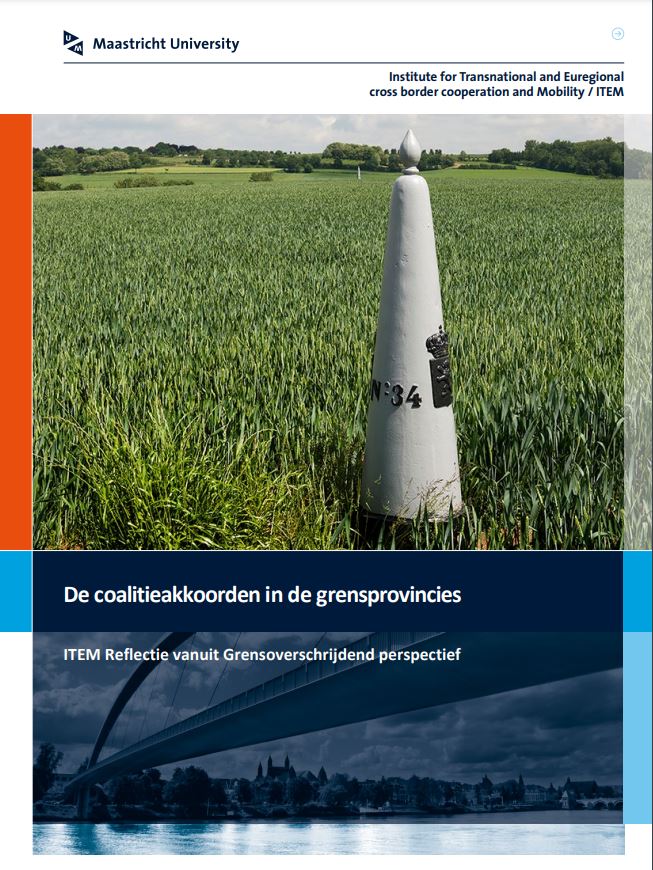 |
| ITEM Reflection: Coalition agreements in the border provinces from a cross-border perspective |
Following the Reflection on the party programmes in the run-up to the Provincial State elections and the ITEM Commentary after the election results, we have now studied the coalition agreements of the parties in the seven border provinces.
In the Reflection as well as in the Commentary we concluded that cross-border cooperation played only a modest part in the party programmes. Therefore, ITEM recommended assigning a more central role to cross-border cooperation in provincial politics. Has this been reflected in the coalition agreements? Is there indeed a greater focus on cross-border cooperation and horizontal cooperation?
This Reflection (in Dutch) focuses on the coalition agreements in the border provinces that have already been published. The same (thematic) method was chosen for this analysis as in the earlier Reflection.
This includes the most important cross-border topics:
- Cross-border labour market
- Cross-border healthcare/welfare
- Cross-border mobility/infrastructure
- Cross-border education and culture
- Cross-border security
- Cross-border energy transition/climate
- Cross-border innovation
- Euroregional governance/cooperation
First, a general overview will be given on the role and position of cross-border cooperation as a theme in the coalition agreement. Next, the various subsections will reflect on the plans in the coalition agreement for each theme. |
|
|
|
|
|
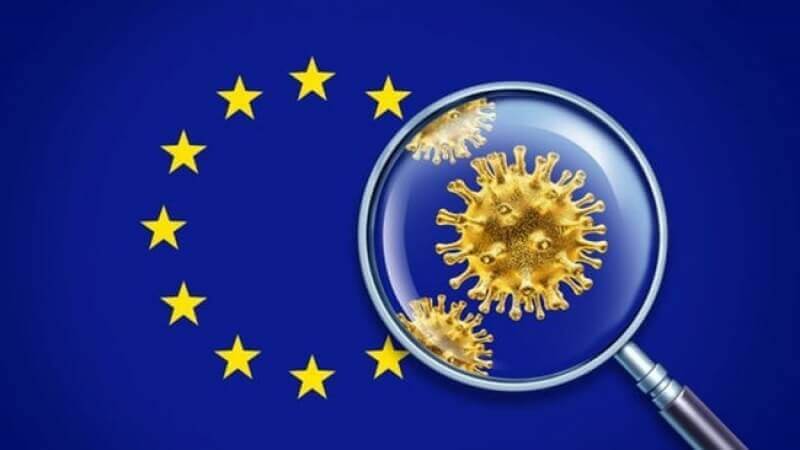 |
| COVID-19: Lessons learned and recommendations for the future |
| The COVID-19 pandemic greatly impacted every aspect of life. On the 19 July 2023, the mandate of the ‘Special committee on the COVID-19 pandemic: lessons learned and recommendations for the future’ (COVI) came to an end. In March 2022, the European Parliament agreed on the establishment of this committee. COVI evaluated the pandemic’s impact on health systems, the vaccination campaign, the broader socio-economic impact, the impact on the rule of law and democracy, and the international response to the pandemic. On 12 June 2023 the final report on the COVID-19 pandemic: lessons learned and recommendations for the future was adopted (with 23 votes in favour, 13 votes against, and 1 abstention). The report highlights the effects of the pandemic on the economic and social life of European citizens, and establishes a set of recommendations to the Commission and Member States to address gaps and weaknesses in the response to the crisis and to better prepare the EU for future cross-border health threats. |
|
|
|
|
|
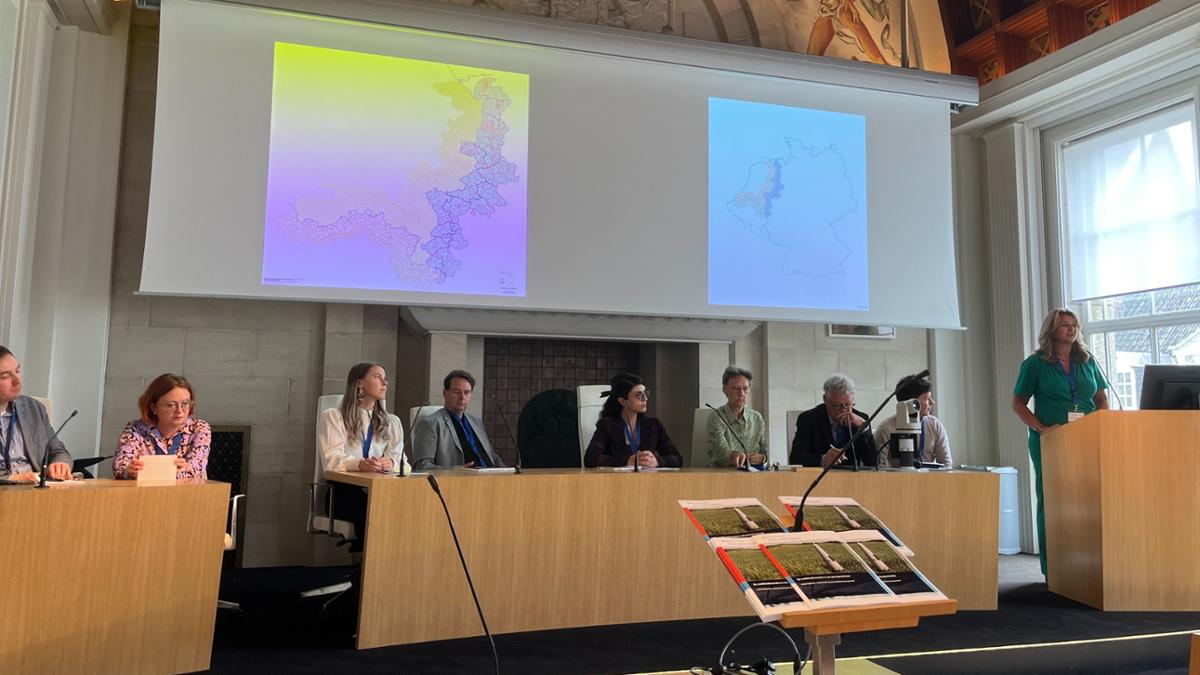 |
| ITEM annual Preuvenemint Meeting |
| ‘Solving cross-border issues by thinking and acting across borders'
On Friday, August 25, the annual ITEM Preuvenemint Meeting took place. The event, with the aim of informing our stakeholders and partners about our activities in the broadest sense, started with short pitches and presentations on the current cross-border transnational and Euregional mobility and cooperation issues we are working on. We carried our audience across national borders into the full extent of our current and upcoming core activities. Furthermore, we presented the selected files of the ITEM Cross-border Impact Assessment 2023 ranging this year from Cross-border & Transnational Infrastructure to Education and from Broad Prosperity in the border region to Security. We concluded the event with drinks at the Preuvenemint in Maastricht where the conversation continued in an informal setting.
Please view the selected files of the Border Impact Assessment 2023 or read more about all our activities on our website. |
|
|
|
|
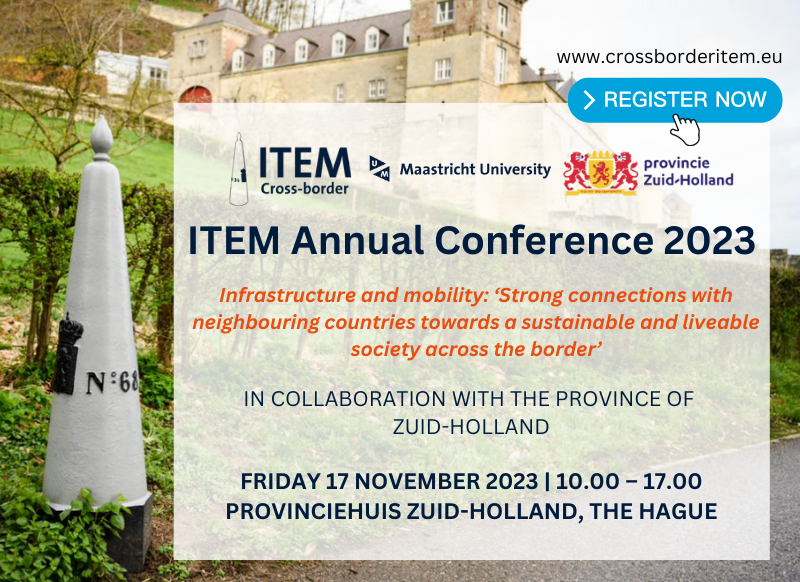 |
| ITEM annual conference 2023 save the date! |
‘Infrastructure and mobility: 'strong connections with neighbouring countries towards a sustainable and liveable society across the border'
In collaboration with the province of zuid-holland. Friday 17th November 2023 | 10.00 – 17.00 provinciehuis zuid-holland, The Hague
SIGN-UP!
Current European developments on energy transition and hydrogen show that for impactful solutions, cross-border cooperation between different layers of government is a condition. Well-functioning European transport corridors are essential for the success of a sustainable and liveable society. By definition, corridors are transcending borders and focus on issues such as pipelines, ports (hydrogen) and rail.
Within corridors are subareas that have often already organised themselves across borders, such as Benelux, Eurodelta, La Grande Région, the Dutch-Flemish cooperation with the initiation of a ‘cross-border coordination point’.
Border transcending objectives of infrastructure and mobility can only be achieved if cross-border cooperation is also actively used. Europe, member states and European regions can then work together to achieve impactful cross-border solutions and applications. How can identifying border effects at the start of new developments increase impact in practice? Forming structural substantive coalitions seems to be the future. How do cross-border governance structures deal with this? In what way can the use of instruments be an important catalyst to achieve border transcending objectives?
The following themes are covered in the programme:
- European integration: how to do it? Working together on “Horizontal integration”.
- Border effects within border transcending corridors: relevance of scale, border effects and cross-border cooperation.
- Transcending border en cross-border hand in hand: “Energy hubs of the future”.
- ITEM in a cross-border society: ITEM Border Effects Report 2023.
- ITEM monitoring: Broad prosperity, every region counts; so does the border region!
The importance of strong connections between neighbouring countries inside and outside Europe, and the insight that we need each other for this, is growing. We would therefore like to discuss with you how we can realise the development towards a sustainable and liveable society with a focus on the European corridors and the cross-border issues involved.
The Province of Zuid-Holland is hosting the ITEM Annual Conference 2023. It will take place at the provincial government building in The Hague.
Of course, we hope to welcome you in person in The Hague on 17 November. |
|
|
|
|
|
 |
| #EURegionsWeek 2023: Don’t miss the ITEM/HNP Side Event on 27 September! |
| What is the impact of increased sustainability of the infrastructure and mobility on European level and how does it affect cross-border regions? We warmly invite you to attend our #EURegionsWeek Side Event, jointly organised with the House of the Dutch Provinces (HNP).
Event
What is the impact of increased sustainability of the infrastructure and mobility on European level and how does it affect cross-border regions? What do the new European frameworks mean for cross border rail transport, pipe transports and inland shipping? What implication does it specifically have for hubs or logistics barriers?
The event will consist of three panels:
- What lessons can we learn from existing cross-border projects on sustainable transport?
- How can we address issues that arise with regard to rail, pipelines, harbours and inland shipping?
- How do we speed-up the transition towards sustainability within transportation through cross-border cooperation between the Netherlands, Belgium and Germany?
Speakers include representatives from the European Commission, Members of the European Parliament, public stakeholders, regional and local politicians, business representatives and scientists. We will announce a more detailed programme in due course.
Register
The event will take place on Sept. 27, 2023 from 13.00-15.00 h. via live stream. The language of the event will be English. Please register here for the event. We look forward to seeing you!
#EURegionsWeek
The HNP and ITEM are hosting their third joint Side Event in 2023 during #EURegionsWeek, the annual European Week for Regions and Cities in Brussels. Previous events focused on cross-border energy cooperation and the impact of COVID-19 on cross-border workers.
In 2023, the 21st edition of #EURegionsWeek will take place from Oct. 9 to 12. The week is specifically dedicated to European regions and regional policy. During this week, representatives of regions and cities from all over Europe will gather in Brussels, including politicians, administrators, experts and academics. Side Events associated with #EURegionsWeek will be organised from September 2023 through November 2023 and can be found on the #EURegionsWeek website starting this summer. |
|
|
|
|
|
 |
| ITEM in the media and contributions |
On 27 February 2023, an overview of recent cases before the Court of Justice of the European Union, written by ITEM-researcher Susanne Sivonen and Pauline Melin, was published in the European Journal of Social Security. Read it here!
|
The ITEM Reflection on the Provincial Elections yielded attention in several media platforms, such as De Limburger, Binnenlands Bestuur, Trouw and Algemeen Dagblad.
|
An opinion of ITEM on the Provincial Elections was published in Reformatorisch Dagblad.
|
Daan Hovens and Susanne Sivonen presented their findings at the Neighbouring Languages Conference of 24 May 2023.
|
Pim Mertens presented the findings of Crossquality, how to measure the quality of cross-border cooperation, at the Interact Knowledge Fair on 23 May 2023 in Ghent.
|
Math Noortmann contributed to the recent plenary session of the Benelux Parliament on 16 June with a presentation. Read more here.
|
Find the latest publications by the ITEM team here.
|
|
|
|
|
|